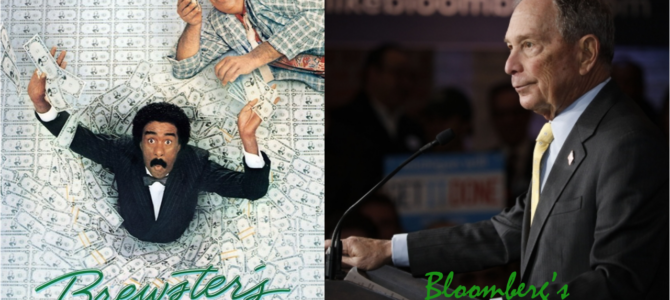American culture has remake and reboot fever. From Oscar darlings (and directorial snubs) like “A Star Is Born” and “Little Women,” to huge franchises returning, including “Indiana Jones” and “Star Wars,” it seems like every enjoyable film of the past is gaining new life in recent years.
Just this week, we saw an adaptation of the 1985 Richard Pryor comedy “Brewster’s Millions” in the Iowa caucus. The film tells the story of a man, Monty Brewster, who has to spend $30 million in 30 days with nothing to show for it, in order to gain an inheritance of $300 million.
To waste as much money as he can, Brewster decides to run for mayor of New York, with every intent of throwing the election. However, his disinterested yet advertisement-heavy campaign strikes a chord with disillusioned NYC voters, and he starts to actually win, much to his chagrin and fear.
The remake substitutes Brewster with a fellow New Yorker, who shares his initials — Michael Bloomberg. Bloomberg is also a millionaire and the former mayor of New York. However, this remake has several differences from the previous version. Bloomberg is running for president, and might actually want to win. Likewise, the genre has shifted from comedy to tragedy. Nevertheless, the underlying theme remains constant: Bloomberg’s Iowa ads cost millions of dollars with nothing to show for it.
While Iowa once was a swing state, it has firmly entrenched itself with the Republican Party. The state, and all 10 of its delegates, will almost certainly be going to Trump in the general election. Therefore, the only benefits Democrats can gain in Iowa are the momentum of succeeding in the first primary, thereby having their victory dominate the news cycle. Yet this didn’t occur this year.
Unusually, the fact that the Iowa caucus was one day before the State of the Union and two before the Senate’s impeachment vote meant that the winner would only have the Monday morning news cycle to benefit from the surge from the early victory, with the rest of the week drowned out by a far more Trump-focused news cycle.
This minor benefit was destroyed when the caucus app glitched, and the results were not available Monday night as expected. While both Pete Buttigeig and Bernie Sanders claimed victory, no one knew how any candidates fared until days later, once the SOTU and impeachment acquittal came and went, and all eyes were already on New Hampshire.
While all of the candidates faced considerable loss to no gain, with the exception of Buttigeig and Bernie’s respective 13 and 12 delegates, it was Bloomberg who lost the most. His astronomical media spending led to him winning a humorously tragic 0 percent of the vote. And none of this media spending will help whoever ultimately becomes the Democratic nominee, as Trump has the state of Iowa all but on lock.
The punchline of this ironic farce comes in the fact that Bloomberg apparently failed to learn his lesson. After his disastrous showing in Iowa, he decided the best course of action would be to double his ad budget. While it is admittedly entertaining to watch a Democratic presidential candidate waste hundreds of millions of his own money with nothing to show for it, I prefer the version with John Candy and Richard Pryor. It was better written and more enjoyable.









